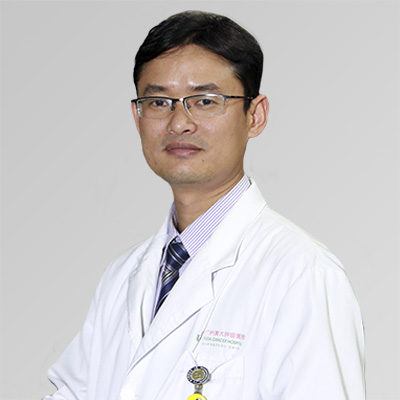Nasopharyngeal carcinoma (NPC), a rare malignant tumor in Europe and the United States, has 60% of patients concentrated in the Guangdong area, and is known as "Guangdong Cancer", which is the only locally-named tumor in the world.

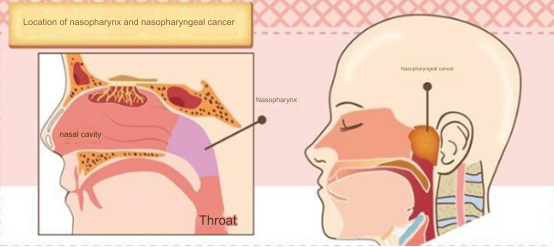
▲Image from the Internet
01 Nasopharyngeal cancer lead to painful radiotherapy
In 2013, Fong (a pseudonym) from Guangdong was diagnosed with nasopharyngeal carcinoma when she went to the hospital because of recurring nasal acidity, pus and nosebleeds, which she felt were not right! Hearing this result, Fong felt that the sky was about to collapse.
Nasopharynx is in a special location, hidden in the middle of the skull and next to many important organs, so nasopharyngeal cancer is not treated mainly by surgery. Since nasopharyngeal cancer is more sensitive to the rays of radiotherapy, radiotherapy becomes the main method.
Radiotherapy, or radiation therapy, uses a gas pedal to produce rays that are shot from outside the body to kill tumors. Many patients are diagnosed and then have to face dozens of radiation treatments next. The process is often painful.
At the beginning, the radiotherapy as well as chemotherapy still benefited Fong. However, as the radiotherapy continued, in just 2 months' time, she lost weight rapidly, from 120 pounds to 70 pounds, not to mention the side effects such as darkened skin, hair loss, and rotting mouth, which seriously affected her physical and mental health. "Well, at least it's working and no tumor recurrence has been detected, so let's stick with it." Ah Fang thought to herself.
In March 2019, however, the tumor recurred. "At that time, tinnitus appeared, MRI suggested that the nasopharyngeal lesion was significantly enlarged, and the biopsy suggested that it was undifferentiated non-keratinizing carcinoma of the nasopharynx." After getting the news that the tumor was making a comeback, Fong was tempted to give up the treatment because it was just too painful. But her child's bitter plea made her persevere again; she couldn't leave her child without a mother.
But Guangzhou big hospitals are so many people, registration is difficult, hospitalization is even more difficult, which makes Fong "more difficult". "Fortunately, I met Dr. Xu Jiongyuan, or I might have 'died'!" In May 2019, Ah Fang came to Guangzhou Fuda Cancer Hospital Medical Department III for treatment.
The Department of Medicine III is a head and neck tumor specialist. In addition to various types of surgical procedures, in the treatment of patients with middle and late stage tumors that cannot be treated surgically, minimally invasive treatments such as nano-knife ablation, cryoablation, microvascular interventions, photodynamic therapy, iodine particle therapy and other therapeutic means are used to win treatment opportunities for the patients, so that they can treat the tumors while preserving the functions of the organs as much as possible.
02. "Subtracting" to achieve "efficient drug reduction"
Based on years of clinical experience, combined with the mature treatment methods for nasopharyngeal cancer in modern medicine, after multidisciplinary expert consultation, considering that Afang's lesion was mainly a local recurrence of nasopharyngeal cancer, no distant metastases were found, and she had previously received intravenous chemotherapy combined with radiotherapy, the experts from the Department of Medicine of the hospital decided to do the "subtractive" treatment. --Firstly, we carried out DSA + perfusion chemotherapy on both external carotid arteries, during which small doses of chemotherapy drugs were used.
On the one hand, interventional perfusion chemotherapy infuses drugs into the core of the tumor under DSA guidance, increasing the concentration of chemotherapeutic drugs in the tumor area; on the other hand, the use of small doses of chemotherapeutic drugs greatly reduces toxic side effects and helps to maintain and improve the quality of life of patients.


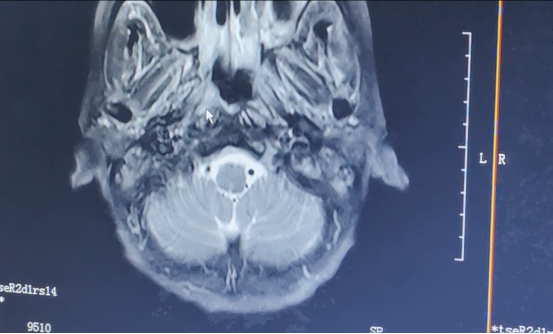
▲ June 2019 Imaging Results
After two cycles of treatment, Fong's nasopharyngeal lesions were significantly reduced in size. Subsequently, the doctor gave her radical radiotherapy. As it was the second radiotherapy, the chance of radiotherapy-related adverse reactions, such as dry mouth, hearing loss, difficulty in opening the mouth, and skin damage, was significantly higher. For this reason, during the radiotherapy period, doctors used adjuvant treatments such as combined triple-oxygen immunotherapy and traditional Chinese medicine to alleviate Fong's adverse reactions and help her successfully complete the radiotherapy. Immunotherapy was also utilized to maintain the treatment.
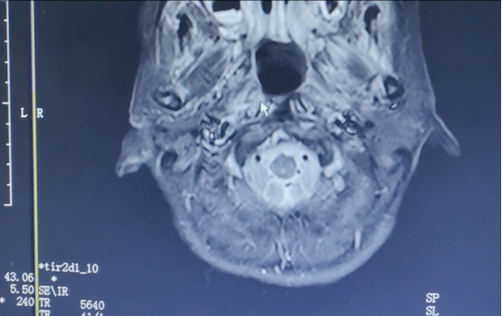
▲July 2023 Imaging Results
Currently, Fong's patient's condition is well controlled, with no recurrence or metastasis on multiple follow-ups, and no radiotherapy-related adverse reactions affecting quality of life. "Fortunately, I didn't give up at that time." Now Fong insists on regular reviews and her mind has changed for the better.

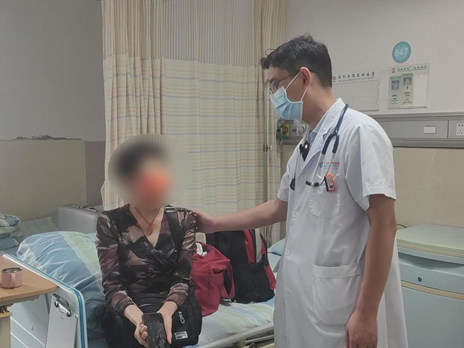
Nasopharyngeal cancer is not a terminal disease, and early detection is curable. It is worth noting that early symptoms of nasopharyngeal cancer have a lot of similarities with rhinitis, which can be easily neglected and misjudged, so that many nasopharyngeal cancer patients are found to be in the middle or late stage.
Director Xu Jiongyuan of Medical Department III of Guangzhou Fuda Cancer Hospital reminds that: bloody nasal mucus, nasal congestion, persistent headache, tinnitus, dullness of ears, hearing loss, swelling of cervical lymph nodes, etc. are common symptoms of early nasopharyngeal carcinoma, and if these symptoms continue to appear for more than 2 weeks, they should be alert and be investigated at the earliest possible time.

